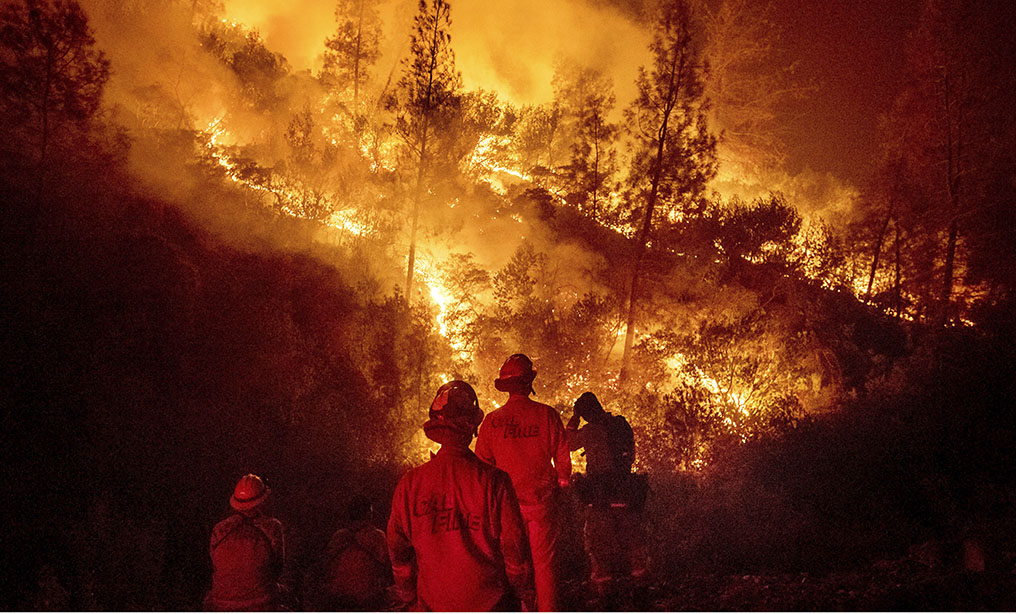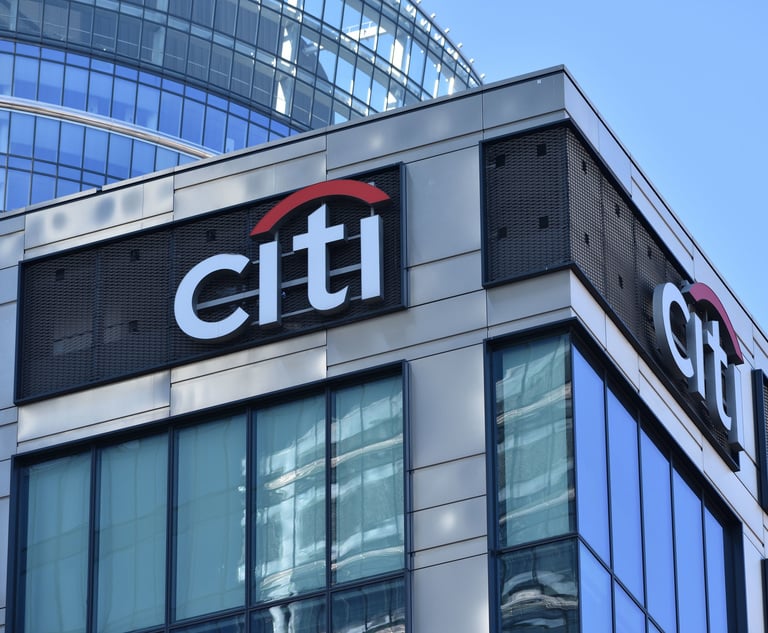NYAG Underwood and Web Companies File New Briefs in Net Neutrality Case
Tech companies, advocacy groups and media companies filed briefs this week in the U.S. Court of Appeals for the District of Columbia Circuit, joining a petition by 22 state attorneys general and D.C. seeking to overturn the FCC order that ended net neutrality.
August 24, 2018 at 11:23 AM
5 minute read
 Firefighters monitor a backfire while battling the Ranch Fire, part of the Mendocino Complex Fire this month near Ladoga, Calif. A nationwide telecommunications company that slowed internet service to firefighters as they battled the largest wildfire in California history says it has removed all speed cap restrictions for first responders on the West Coast. Verizon Senior Vice President Mike Maiorana says the service restrictions were removed as of Aug. 23, and include Hawaii, where emergency crews have rescued people from areas flooded by Hurricane Lane. Photo: Noah Berger/AP
Firefighters monitor a backfire while battling the Ranch Fire, part of the Mendocino Complex Fire this month near Ladoga, Calif. A nationwide telecommunications company that slowed internet service to firefighters as they battled the largest wildfire in California history says it has removed all speed cap restrictions for first responders on the West Coast. Verizon Senior Vice President Mike Maiorana says the service restrictions were removed as of Aug. 23, and include Hawaii, where emergency crews have rescued people from areas flooded by Hurricane Lane. Photo: Noah Berger/AP
Several internet-dependent companies and advocacy groups earlier this week filed a brief in a petition before a federal appeals court in Washington, D.C., asking the court to review the Federal Communication Commission's decision last year to end Obama-era net neutrality rules.
Software developer Mozilla Corp., video-sharing service Vimeo LLC, and e-commerce site Etsy Inc., and numerous other technology advocacy groups and media companies filed the brief Monday in the U.S. Court of Appeals for the District of Columbia Circuit [#18-1051], joining a petition led by New York Attorney General Barbara Underwood and attorneys general of 21 other states and D.C. against the FCC order ending net neutrality.
Government petitioners in the case also filed a new brief on Monday that includes an addendum stating that firefighters battling wildfires in Northern California were hampered when their internet service provider, Verizon, slowed the internet speeds on the Fire Department's communications equipment and told them the only way to ramp up the speed was to pay for a new data plan. Verizon claimed a customer service error was responsible and not the net neutrality rollback, according to the Los Angeles Times and other accounts.
The Mozilla et al brief argues that the FCC's rationale for reclassifying broadband internet access service as an information service rather than as telecommunications, and delegating authority to the Federal Trade Commission and Department of Justice, is “unambiguously contrary to the law.”
The revised FCC rules under Chairman Ajit Pai, which took effect in June, were a win for big internet service providers, including AT&T, Comcast Corp. and Verizon Communications Inc. Large companies such as Facebook, Google and Amazon, however, put up opposition. The order also pre-empts states from passing regulation similar to the 2015 order.
The protective petition for review was filed in January with the appeals court by attorneys general from New York, California, Connecticut, Delaware, D.C., Illinois, New Jersey, Pennsylvania and Virginia, among others. The states claim that the FCC's order terminating “net neutrality” rules, which required that all internet traffic be treated equally, threatens public health and safety.
The governments' brief further argues that the FCC order was not only “arbitrary and capricious,” but unlawfully attempts to pre-empt state and local regulation. The petition asks the court to vacate and reverse the FCC order. Oral arguments are not yet scheduled.
In an addendum to the government brief filed by Santa Clara County Counsel, Underwood and the California Public Utilities Commission, Fire Chief Anthony Bowden made a declaration in which he claimed Verizon “throttled,” or slowed, the fire department's data connection speeds in the middle of battling the Mendocino Complex fires, and said the county would have to switch to a new data plan at more than twice the cost in order to increase the speed despite an emergency request.
Etsy and the Coalition of Internet Openness are represented by Steptoe & Johnson LLP lawyers Pantelis Michalopoulos, Cynthia Taub and Travis West. Steptoe lawyers Markham Ericson and Georgios Leris represent Mozilla and INCOMPAS. General counsel of Vimeo, Michael Chea, represents the company. A host of other lawyers represented other interested trade groups in the brief.
Meanwhile, in California, state net neutrality legislation was approved by a key Assembly committee and was headed to a floor vote in the chamber next week. The bill was approved by the state Senate in May. Legislation requiring net neutrality has been introduced in 29 states, according to the National Conference of State Legislatures in response to the Restoring Internet Freedom Order issued Jan. 4 that ended net neutrality as federal law. Governors in six states including Hawaii, Montana, New Jersey, New York, Rhode Island and Vermont have since signed executive orders requiring net neutrality within their states, and another three states—Oregon, Vermont and Washington—had enacted net neutrality legislation as of last month.
Pai said on CNBC in June that he did not believe that the states' efforts would be successful. “What we're going to do is take a look on a case-by-case basis at each state law and determine the right course, but at a broad level, the internet is inherently an interstate service,” he said.
This content has been archived. It is available through our partners, LexisNexis® and Bloomberg Law.
To view this content, please continue to their sites.
Not a Lexis Subscriber?
Subscribe Now
Not a Bloomberg Law Subscriber?
Subscribe Now
NOT FOR REPRINT
© 2025 ALM Global, LLC, All Rights Reserved. Request academic re-use from www.copyright.com. All other uses, submit a request to [email protected]. For more information visit Asset & Logo Licensing.
You Might Like
View All
New York-Based Skadden Team Joins White & Case Group in Mexico City for Citigroup Demerger

Bankruptcy Judge Clears Path for Recovery in High-Profile Crypto Failure
3 minute read
US Judge Dismisses Lawsuit Brought Under NYC Gender Violence Law, Ruling Claims Barred Under State Measure
Trending Stories
- 1We the People?
- 2New York-Based Skadden Team Joins White & Case Group in Mexico City for Citigroup Demerger
- 3No Two Wildfires Alike: Lawyers Take Different Legal Strategies in California
- 4Poop-Themed Dog Toy OK as Parody, but Still Tarnished Jack Daniel’s Brand, Court Says
- 5Meet the New President of NY's Association of Trial Court Jurists
Who Got The Work
J. Brugh Lower of Gibbons has entered an appearance for industrial equipment supplier Devco Corporation in a pending trademark infringement lawsuit. The suit, accusing the defendant of selling knock-off Graco products, was filed Dec. 18 in New Jersey District Court by Rivkin Radler on behalf of Graco Inc. and Graco Minnesota. The case, assigned to U.S. District Judge Zahid N. Quraishi, is 3:24-cv-11294, Graco Inc. et al v. Devco Corporation.
Who Got The Work
Rebecca Maller-Stein and Kent A. Yalowitz of Arnold & Porter Kaye Scholer have entered their appearances for Hanaco Venture Capital and its executives, Lior Prosor and David Frankel, in a pending securities lawsuit. The action, filed on Dec. 24 in New York Southern District Court by Zell, Aron & Co. on behalf of Goldeneye Advisors, accuses the defendants of negligently and fraudulently managing the plaintiff's $1 million investment. The case, assigned to U.S. District Judge Vernon S. Broderick, is 1:24-cv-09918, Goldeneye Advisors, LLC v. Hanaco Venture Capital, Ltd. et al.
Who Got The Work
Attorneys from A&O Shearman has stepped in as defense counsel for Toronto-Dominion Bank and other defendants in a pending securities class action. The suit, filed Dec. 11 in New York Southern District Court by Bleichmar Fonti & Auld, accuses the defendants of concealing the bank's 'pervasive' deficiencies in regards to its compliance with the Bank Secrecy Act and the quality of its anti-money laundering controls. The case, assigned to U.S. District Judge Arun Subramanian, is 1:24-cv-09445, Gonzalez v. The Toronto-Dominion Bank et al.
Who Got The Work
Crown Castle International, a Pennsylvania company providing shared communications infrastructure, has turned to Luke D. Wolf of Gordon Rees Scully Mansukhani to fend off a pending breach-of-contract lawsuit. The court action, filed Nov. 25 in Michigan Eastern District Court by Hooper Hathaway PC on behalf of The Town Residences LLC, accuses Crown Castle of failing to transfer approximately $30,000 in utility payments from T-Mobile in breach of a roof-top lease and assignment agreement. The case, assigned to U.S. District Judge Susan K. Declercq, is 2:24-cv-13131, The Town Residences LLC v. T-Mobile US, Inc. et al.
Who Got The Work
Wilfred P. Coronato and Daniel M. Schwartz of McCarter & English have stepped in as defense counsel to Electrolux Home Products Inc. in a pending product liability lawsuit. The court action, filed Nov. 26 in New York Eastern District Court by Poulos Lopiccolo PC and Nagel Rice LLP on behalf of David Stern, alleges that the defendant's refrigerators’ drawers and shelving repeatedly break and fall apart within months after purchase. The case, assigned to U.S. District Judge Joan M. Azrack, is 2:24-cv-08204, Stern v. Electrolux Home Products, Inc.
Featured Firms
Law Offices of Gary Martin Hays & Associates, P.C.
(470) 294-1674
Law Offices of Mark E. Salomone
(857) 444-6468
Smith & Hassler
(713) 739-1250







